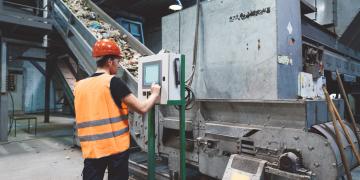In the past fifty years, human consumption of natural resources and raw materials has increased tenfold. Consequently, the materials used to produce consumer goods are becoming increasingly scarce. Moreover, their manufacturing generates greenhouse gas emissions, and as they are thrown away after use, this increases the volume of waste, which is also a source of pollution. The production of new consumer goods then requires new resources, depleting them once again.
Waste becomes a resource
Although historically seen as unusable, waste is considered to be a useful resource in a circular economyThe circular economy is a restorative and regenerative economy. By maintaining the value of the products, materials and resources in the economy through smart product design, repurposing and/or shared use of products, it reduces the extraction of natural resources by using resources already present in the economy.. Waste collection and treatment has a direct impact on the environment. Transforming waste into resources reduces the environmental impact, maintains raw materials in the economic cycle and safeguards the supply of resources. There are different forms of waste recovery. The management and methods of recyclingAny recovery operation through which waste, including organic waste, is reprocessed to become substances, materials or products that can be used for their initial function or other functions. are adapted depending on the type of waste (hazardous or non-hazardous waste) and their origin (household, business etc.). Certain waste is subject to Extended Producer Responsibility (EPR), meaning that those who place the product on the market (producers/importers) are responsible for managing the waste from that product.
Preventing waste production
Although recycling is one of the facets of the circular economy, it also requires a lot of energy and resources. It is therefore better to prevent the production of waste to limit its quantities as much as possible. This can be done through:
- ecological product design,
- extending the product lifespan,
- promoting responsible consumption behaviour (especially reuseReuse designates all operations by which substances, materials or products that are not waste are used again in an identical way to their originally intended purpose. or sharing).
This prevention saves on the use of raw materials from natural or non-renewable resourcesRenewable resources are the energy and raw materials that come from renewable sources.. The best waste is no waste!
Read more:
BeCircular: resources and waste (Brussels Capital Region)
Brussel Environnement: from waste to resources
Walloon legislation on management
Durable management of waste and materials in Flanders
OVAM: waste & resources (Flemish Region)







